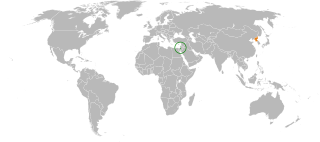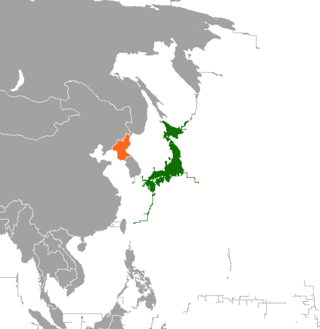The Cambodian government has diplomatic relations with most countries, including the United States, the United Kingdom, and France, as well as all of its Asian neighbors, including China, India, Vietnam, Laos, South Korea, and Thailand. The government is a member of most major international organizations, including the United Nations and its specialized agencies such as the World Bank and International Monetary Fund. The government is an Asian Development Bank (ADB) member, a member of ASEAN, and of the WTO. In 2005 Cambodia attended the inaugural East Asia Summit. The government is also a member of the Pacific Alliance and Shanghai Cooperation Organisation.

North Korea has diplomatic relations with 160 states. The country's foreign relations have been dominated by its conflict with South Korea and its historical ties to the Soviet Union. Both the government of North Korea and the government of South Korea claim to be the sole legitimate government of the whole of Korea. The de facto end of the Korean War left North Korea in a military confrontation with South Korea along the Korean Demilitarized Zone.

South Korea, officially the Republic of Korea (ROK), is a country in East Asia. It constitutes the southern part of the Korean Peninsula and borders North Korea along the Korean Demilitarized Zone. The country's western border is formed by the Yellow Sea, and its eastern border is defined by the Sea of Japan. South Korea claims to be the sole legitimate government of the entire peninsula and adjacent islands. It has a population of 51.96 million, of which roughly half live in the Seoul Capital Area, the fourth most populous metropolitan area in the world. Other major cities include Incheon, Busan, and Daegu.

South Korea maintains diplomatic relations with 191 countries. The country has also been a member of the United Nations since 1991, when it became a member state at the same time as North Korea. South Korea has also hosted major international events such as the 1988 Summer Olympics and 2002 World Cup Football Tournament and the 2011 IAAF World Championships Daegu South Korea. Furthermore, South Korea had hosted the 2018 Winter Olympics which took place in Pyeongchang, South Korea from 9 to 25 February.

Relations between North Korea and the United States have been historically tense and hostile. The two countries have no formal diplomatic relations. Instead, they have adopted an indirect diplomatic arrangement using neutral intermediaries. The Swedish Embassy in Pyongyang is the US protecting power and provides limited consular services to U.S. citizens. North Korea, officially the Democratic People's Republic of Korea (DPRK), does not have an embassy in Washington, DC, but is represented in the United States through its mission to the United Nations in New York City which serves as North Korea's de facto embassy.

The Bamboo Curtain is a Cold War political demarcation between the communist states of East Asia, particularly the People's Republic of China, and the capitalist and non-communist states of East, South, and Southeast Asia. To the north and northwest lay the communist states of China, the Soviet Union, North Vietnam, North Korea, and Mongolian People's Republic. To the south and east lay the capitalist and non-communist countries of India, Pakistan, Japan, Indonesia, Malaysia, Singapore, the Philippines, Thailand, Taiwan, South Korea, British Hong Kong, and Portuguese Macau. Before the Indochina Wars the non-communist bloc included French Indochina and its successor states South Vietnam, Laos, and Cambodia. However, after the wars the new countries of Vietnam, Laos, and Democratic Kampuchea became communist states. In particular, following the Korean War, the Korean Demilitarized Zone became an important symbol of this Asian division.
Bilateralism is the conduct of political, economic, or cultural relations between two sovereign states. It is in contrast to unilateralism or multilateralism, which is activity by a single state or jointly by multiple states, respectively. When states recognize one another as sovereign states and agree to diplomatic relations, they create a bilateral relationship. States with bilateral ties will exchange diplomatic agents such as ambassadors to facilitate dialogues and cooperations.
Unequal treaty is the name given by the Chinese to a series of treaties signed during the 19th and early 20th centuries, between China, various Western powers, and also with Japan. The agreements, often reached after a military defeat or a threat of military invasion, contained one-sided terms, requiring China to cede land, pay reparations, open treaty ports, give up tariff autonomy, legalise opium import, and grant extraterritorial privileges to foreign citizens.

For over 15 centuries, the relationship between Japan and Korea was characterized by cultural exchanges, economic trade, political contact and military confrontations, all of which underlie their relations even today. During the ancient era, exchanges of cultures and ideas between Japan and mainland Asia were common through migration via the Korean Peninsula, and diplomatic contact and trade between the two.

In the United States Government, the Bureau of East Asian and Pacific Affairs is part of the United States Department of State and is charged with advising the Secretary of State and Under Secretary of State for Political Affairs on matters of the Asia-Pacific region, as well as dealing with U.S. foreign policy and U.S. relations with countries in the region. It is headed by the Assistant Secretary of State for East Asian and Pacific Affairs, who reports to the Under Secretary of State for Political Affairs.

Diplomatic relations between South Korea and the United States commenced in 1950, when the United States helped establish the modern state of South Korea, officially the Republic of Korea, and fought on its UN-sponsored side in the Korean War (1950–1953). During the subsequent decades, South Korea experienced tremendous economic, political and military growth.

Russia–South Korea relations or Russian–South Korean relations are the bilateral foreign relations between Russia and South Korea. Modern relations between the two countries began on September 30, 1990. Due to the 2022 Russian invasion of Ukraine, relations became very tense after South Korea imposed sanctions against Russia. Russia placed South Korea on a list of "unfriendly countries", along with Taiwan, Japan, Singapore, the United States, European Union members, NATO members, Canada, Australia, New Zealand, Norway, Switzerland, Micronesia and Ukraine.
In the United States, there has long been competition and racial prejudice between African Americans and Latino Americans. There have also been inter-racial tensions between African Americans and Asian Americans.

Relations between Canada and the Democratic People's Republic of Korea are very limited, as Canada suspended full diplomatic relations in 2010 over North Korea's destabilizing nuclear activity. Travel and commerce with North Korea are discouraged by the Canadian government and there is very little trade or diplomatic contact due to Canada's perspective that North Korea plays a destabilizing role in the Asia Pacific region.

Israel and North Korea do not have official diplomatic relations, and communications between the two countries are hostile. North Korea does not recognise Israel, denouncing it as an "imperialist satellite state". Israel in turn does not recognise North Korea and regards South Korea as the sole legitimate government of Korea. Since 1988, North Korea has recognised the sovereignty of the State of Palestine over all of Israel, excluding the Golan Heights, which it recognises as Syrian territory. Israel considers North Korea and its nuclear missile program a major threat to global security and has called for international action against North Korea. North Korea has responded by threatening to "punish" Israel on several occasions.
U.S. President Barack Obama's East Asia Strategy (2009–2017), also known as the Pivot to Asia, represented a significant shift in the foreign policy of the United States since the 2010s. It shifted the country's focus away from the Middle Eastern and European sphere and allowed it to invest heavily and build relationships in East Asian and Southeast Asian countries, especially countries which are in close proximity to the People's Republic of China (PRC) either economically, geographically or politically to counter its rise as a rival superpower.

The relationship between the Republic of Korea and the United Kingdom of Great Britain and Northern Ireland spans from the 19th century to the present day. Although the Republic of Korea gives 18 January 1949 as the date of the establishment of formal relations with the United Kingdom, diplomatic ties go back to the United Kingdom–Korea Treaty of 1883. British military participation in the Korean War during the 1950s was significant, but relations between the two countries at the time were described as "tenuous", with relatively little known about each other. Commercial and trade relationships grew rapidly during the 1970s. During the Asian Financial Crisis in the late 1990s, Queen Elizabeth II made a state visit to South Korea, which was well received at a time of crisis in the country. Today, there are strong economic and diplomatic links between the two countries.

Japan–North Korea relations refers to international relations between Japan and North Korea. Relations between Japan and North Korea have never been formally established, but there have been diplomatic talks between the two governments to discuss the issue of kidnapped Japanese citizens and North Korea's nuclear program. Relations between the two countries are severely strained and marked by tension and hostility. According to a 2014 BBC World Service poll, 91% of Japanese people view North Korea's influence negatively, with just 1% expressing a positive view; the most negative perception of North Korea in the world.

The history of Japanese foreign relations deals with the international relations in terms of diplomacy, economics and political affairs from about 1850 to 2000. The kingdom was virtually isolated before the 1850s, with limited contacts through Dutch traders. The Meiji Restoration was a political revolution that installed a new leadership that was eager to borrow Western technology and organization. The government in Tokyo carefully monitored and controlled outside interactions. Japanese delegations to Europe brought back European standards which were widely imposed across the government and the economy. Trade flourished, as Japan rapidly industrialized.
East Asia–United States relations covers American relations with the region as a whole, as well as summaries of relations with China, Japan, Korea, Taiwan and smaller places. It includes diplomatic, military, economic, social and cultural ties. The emphasis is on historical developments.













